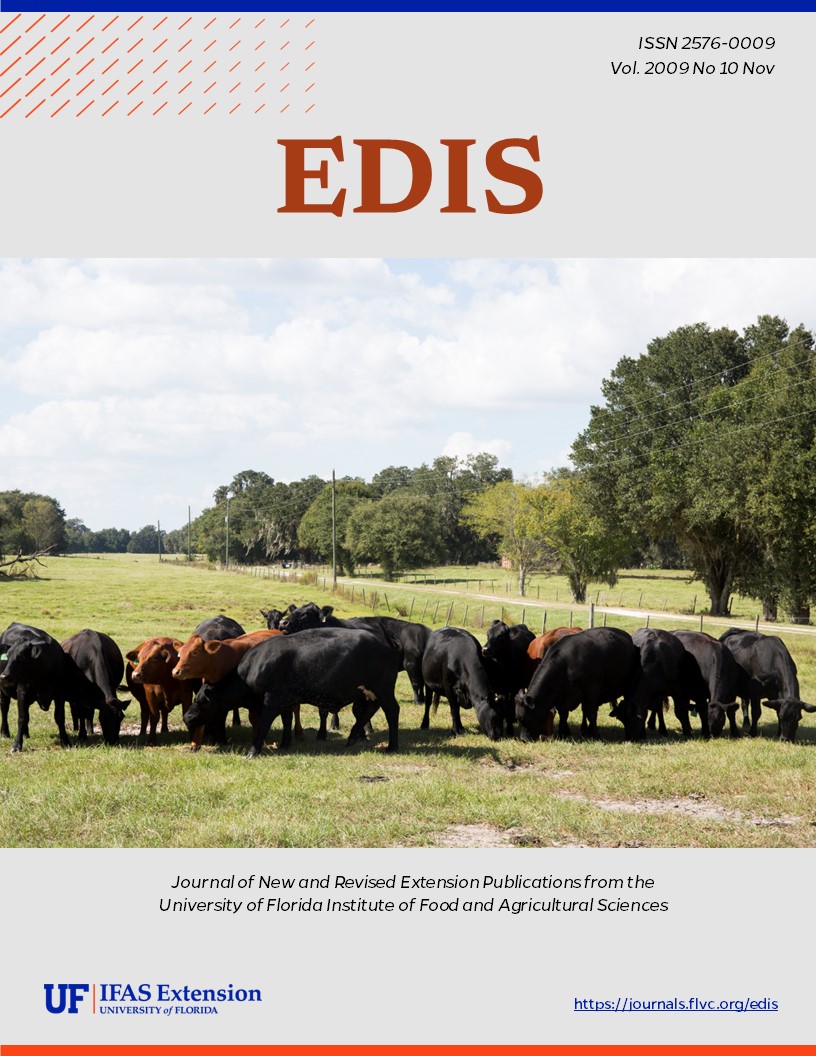Abstract
ENY853, a 3-page fact sheet by J. P. Cuda and J. H. Frank, describes the role of biological control agents in controlling nonnative invasive weeds, lists the arthropod biological control agents that are established for seven invasive weeds, and provides links to additional resources. Includes references. Published by the UF Department of Entomology and Nematology, September 2009.
References
Buckingham, G. R. 1994. Biological control of aquatic weeds, pp. 413-480. In: D. Rosen, F. D. Bennett and J. L. Capinera (eds.). Pest management in the subtropics: biological control - a Florida perspective. Intercept, Andover, U.K.
Center, T. D. 1994. Biological control of weeds: Waterhyacinth and waterlettuce, pp. 481-521. In: D. Rosen, F. D. Bennett and J. L. Capinera (eds.). Pest management in the subtropics: biological control - a Florida perspective. Intercept, Andover, U.K.
Center, T. D., J. H. Frank and F. A. Dray, Jr. 1997a. Biological control, pp. 245-263. In: D. Simberloff, D. C. Schmitz and T. C Brown (eds.). Strangers in paradise: Impact and management of nonindigenous species in Florida. Island Press, Washington, D.C.
Center, T. D., F. A. Dray, G. Jubinsky and M. J. Godowitz. 2002. Insects and other arthropods that feed on aquatic and wetland plants. USDA, Agric. Res. Serv., Tech. Bull. 1870, Fort Lauderale, FL. 200 pp.
Cuda, J. P., R. Charudattan, M. J. Grodowitz, R. M. Newman, J. F. Shearer, M. L. Tamayo, and B. Villegas. 2007. Recent advances in biological control of submersed aquatic weeds. J. Aquat. Plant Manage. 46: 15-32.
Cuda, J. P., A. P. Ferriter, V. Manrique and J. C. Medal (eds.) 2006. Interagency Brazilian peppertree (Schinus terebinthifolius) management plan for Florida, 2nd edition: Recommendations from the Brazilian Peppertree Task Force, Florida Exotic Pest Plant Council. South Florida Water Management District, West Palm Beach, FL. http://ipm.ifas.ufl.edu/pdf/BPmanagPlan.pdf.
Frank, J. H. and E. D. McCoy. 2007. The risk of classical biological control in Florida. Biological Control 41: 151-174. https://doi.org/10.1016/j.biocontrol.2007.01.006
[FWC] Florida Fish and Wildlife Conservation Commission. 2008. Non-natives: Invasive plant management. http://myfwc.com/nonnatives/InvasivePlants/index.htm (accessed 14 August 2008).
Habeck, D.H., F.D. Bennett, and J.K. Balciunas. 1994. Biological control of terrestrial and wetland weeds, pp. 523-547. In D. Rosen, F.D. Bennett, and J.L. Capinera (eds.), Pest Management in the Subtropics: Biological Control-Florida Perspective. Intercept, Andover, United Kingdom.
Julien, M. H. and M. W. Griffiths. 1998. Biological control of weeds: A world catalogue of agents and their target weeds, 4th edition. CAB International, Wallingford.
Pimentel, D., L. Lach, R. Zuniga, and D. Morrison. 2000. Environmental and economic costs of nonindigenous species in the United States. BioScience 50: 53-65. https://doi.org/10.1641/0006-3568(2000)050[0053:EAECON]2.3.CO;2
Pimentel, D., R. Zuniga, and D. Morrison. 2005. Update on the environmental and economic costs associated with alien-invasive species in the United States. Ecological Economics 52: 273-288. https://doi.org/10.1016/j.ecolecon.2004.10.002
Pimm, S. and M. Gilpin. 1989. Theoretical issues in conservation biology, pp. 287-305. In R. Roughgarden, R. May, and S. Leven (eds.), Perspectives in Ecological Theory. Princeton University Press, Princeton, New Jersey. https://doi.org/10.1515/9781400860180.287
Randall, J. 1996. Weed control for the preservation of biological diversity. Weed Technology 10: 370-38. https://doi.org/10.1017/S0890037X00040124
Simberloff, D. 1997. The biology of invasions, pp. 3-18. In D. Simberloff, D.C. Schmitz, and T. C. Brown (eds.). Strangers in paradise: Impact and management of nonindigenous species in Florida. Island Press, Washington, DC.
Van Driesche, R. S. Lyon, B. Blossey, M. Hoddle and R. Reardon (eds.). 2002. Biological Control of Invasive Plants in the Eastern United States, USDA Forest Service Publication FHTET-2002-04. USDA Forest Service, Morgantown, West Virginia, USA. pp.311-321. http://www.invasive.org/eastern/biocontrol.
Williams, J.R. 1954. The biological control of weeds. In: Report of the Sixth Commonwealth Entomological Congress, London, 7-16 July 1954. 95-98. https://doi.org/10.1111/j.1946-150X.1954.tb01045.x

